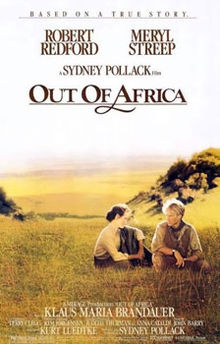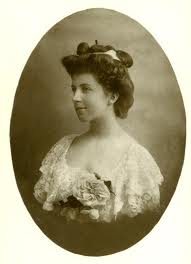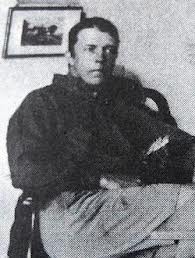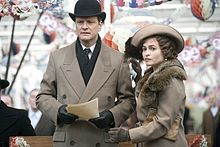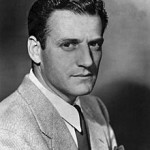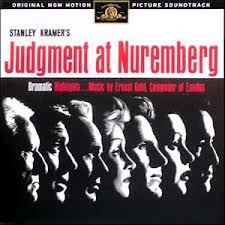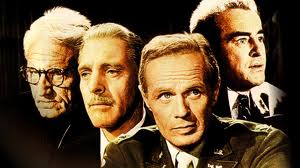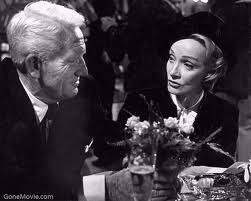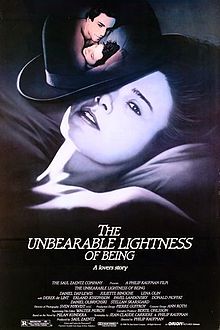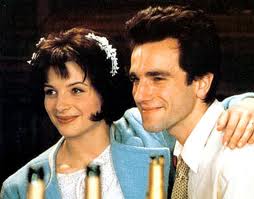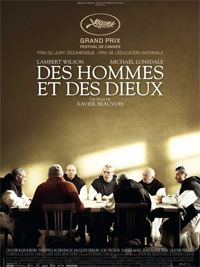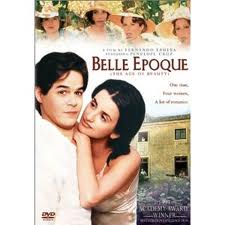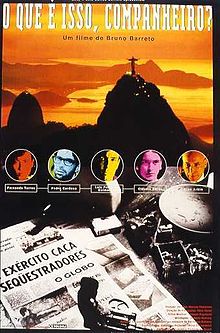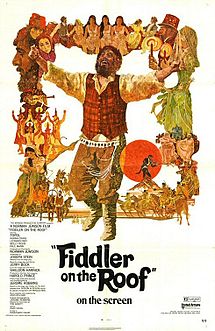 Jewish author Sholem Aleichem was born in 1859 in Ukraine—which was a territory of the Russian Empire in those days—and wrote the short novel Tevye the Dairyman in 1894; in 1961, the musical Fiddler on the Roof based on his stories was performed on Broadway, and it became a big hit. In the 1971 film adaptation of this musical, Norman Jewison was the director and producer, and screenwriter Joseph Stein was in charge of the screenplay. It depicts the dairyman Tevye living in a village with his five daughters, the marriage of the older three daughters, and the family being chased from their hometown and immigrating to America due to persecution by the Russian Empire.
Jewish author Sholem Aleichem was born in 1859 in Ukraine—which was a territory of the Russian Empire in those days—and wrote the short novel Tevye the Dairyman in 1894; in 1961, the musical Fiddler on the Roof based on his stories was performed on Broadway, and it became a big hit. In the 1971 film adaptation of this musical, Norman Jewison was the director and producer, and screenwriter Joseph Stein was in charge of the screenplay. It depicts the dairyman Tevye living in a village with his five daughters, the marriage of the older three daughters, and the family being chased from their hometown and immigrating to America due to persecution by the Russian Empire.
This movie has two major themes. First, as with the original novel, there is the change of times where a Jewish family that keeps tradition and lives peacefully in the community is forced to cope with changes when the daughters want to choose their marriage partners. When director Norman Jewison was later asked in an interview about the audience’s reaction to the movie (the interviewer had New York’s reaction in mind when they asked the question), he spoke of his experience in Japan. He said the reaction of the Japanese audience was frequently, “If you change the faces and remove the western clothes, what this movie depicts is simply modern Japan,” and regarding this, he said, “The Japanese audience was wonderful and had a true understanding of this movie; I think they deeply related to this movie.” He visited Japan in 1971, and even 20 years later, his favorable impression of the reaction by the Japanese audience still remains, and he talks about this favorable impression without being prompted.
I think the generation gap depicted in this movie was a big problem for Japan in the 1960s and 70s. Those days were a time of political change worldwide. However, the idea of, “marrying someone nearby with whom you were set up by a matchmaker”—which was until then the absolute marriage principle in Japan—started crumbling in the 70s. Up until then, matching pedigrees was the main thing that was considered for a spouse, but in times of rapid economic growth, “financial strength” began to be a new factor; additionally, a woman wished to marry a man she loved. In short, the parents may be at a loss if the three factors—pedigree, financial strength, and love—contradict; in regards to financial strength, “academic background” and “occupation” have to be considered, and in regards to love, “appearance” and “personality” come into play. Thus, parents no longer had a clear standard for what out of these factors was most important. Which out of, “very respectable education, but low income,” and “not a great academic background, but fairly rich person” to choose? Or which has more value between, “a new rich family without a good pedigree” and, “a child from a declined respectable family”? Choosing this in one situation and that in a different situation is the same thing that the father Tevye does in the movie. In the end, the eldest daughter marries the poor, young man whom she loves over the “the aged, rich man who worked as a butcher, a profession considered to be lowly,” that the matchmaker was pushing for. The second daughter yearns for the son of the clergyman—who has the top social status in the village—but in the end she falls in love with her tutor who educates her; when he gets deported to Siberia for participating in the revolutionary movement, she decides to follow him to Siberia. The third daughter elopes with a man who is not Jewish, and they get married in a Greek Orthodox Church. While Tevye can one way or another forgive the eldest and second daughters for their actions, he cannot forgive the third daughter for her marriage. In Japan, the confusing marriage conditions seem to be changing today into something simpler: “three highs” (high height, high education, and high income); but it wasn’t so simple in the social transition period 50 years ago. Also, in modern times, “matchmakers” have died out, and some in the younger generation may not know of them at all.
The other theme, which is added to both the movie and musical adaptations, is the persecution of Jews that happened in the last years of the Russian Empire. The persecution of Jews is called “pogrom” in Russian. The culprits of the pogrom cannot be pinpointed, but when dissatisfied people rioted and mutinied, Jews were at times collaterally attacked; also, when Alexander II was assassinated in 1881, an anti-Semitic pogrom occurred in Russia. Even in Battleship Potemkin, we can see the deep-rooted anti-Semitism in those days. Since the government of the Russian Empire suggested the expulsion of Jews as a solution to social dissatisfaction, the pogrom was fostered and intensified from 1903 to 1906, and Jews continued to seek refuge abroad. The author of the original story, Sholem Aleichem, also fled to America in 1905. Movie director Steven Spielberg’s ancestors were also Ukrainian Jews, but they immigrated to America before World War I started. Sholem Aleichem and Steven Spielberg’s ancestors probably immigrated to America around the same time for the same reason.
 It is said that the title change from Tevye the Dairyman to the charming title Fiddler on the Roof when the story was adapted into a musical was inspired by a painting by the Jewish artist Chagall. When Roman Emperor Nero massacred Jews in the Roman Empire, among the people running about trying to escape, it is said that there was a man who played the violin on a roof; the title was inspired by Chagall’s depiction of this historical incident. Marc Chagall was born in Belarus, a Russian territory at the time (currently the northern neighbor of Ukraine), in 1887. He moved to France in 1922, but in 1941, he immigrated to America to avoid persecution by the Nazis. In the end, he returned to France after World War II, and he lived there as a Frenchman for the rest of his life. When Tevye the Dairyman was changed to Fiddler on the Roof, an additional societal element was added to the original.
It is said that the title change from Tevye the Dairyman to the charming title Fiddler on the Roof when the story was adapted into a musical was inspired by a painting by the Jewish artist Chagall. When Roman Emperor Nero massacred Jews in the Roman Empire, among the people running about trying to escape, it is said that there was a man who played the violin on a roof; the title was inspired by Chagall’s depiction of this historical incident. Marc Chagall was born in Belarus, a Russian territory at the time (currently the northern neighbor of Ukraine), in 1887. He moved to France in 1922, but in 1941, he immigrated to America to avoid persecution by the Nazis. In the end, he returned to France after World War II, and he lived there as a Frenchman for the rest of his life. When Tevye the Dairyman was changed to Fiddler on the Roof, an additional societal element was added to the original.
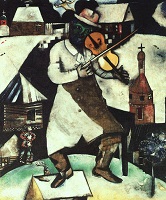 The charm of this movie is naturally the beautiful music (such as the famous song, “Sunrise, Sunset”), as well as the cinematography that wonderfully recreates the Jewish community living in Russia in those times. It is said that the movie company that financed this movie requested it to be shot in America, but Norman Jewison chose to shoot in Yugoslavia, despite the strict budget, because it still had the atmosphere of those times. However, the greatest appeal is the way Tevye lives: despite the different value systems spreading due to the changing world situation, he keeps his traditional values while accepting changes. He lives in a community that helps each other, and is determined to protect his family—as a father and as a patriarch—against whatever happens. People of different religions were able to live peacefully together as a community in this area for hundreds of years, so the tradition of helping each other was developed based on a sense of security and then passed on. Unfortunately, the times that Tevye lived in were the times when this tradition was being destroyed by political changes. It is sad that this rich tradition in the hearts of good people was trampled in those times.
The charm of this movie is naturally the beautiful music (such as the famous song, “Sunrise, Sunset”), as well as the cinematography that wonderfully recreates the Jewish community living in Russia in those times. It is said that the movie company that financed this movie requested it to be shot in America, but Norman Jewison chose to shoot in Yugoslavia, despite the strict budget, because it still had the atmosphere of those times. However, the greatest appeal is the way Tevye lives: despite the different value systems spreading due to the changing world situation, he keeps his traditional values while accepting changes. He lives in a community that helps each other, and is determined to protect his family—as a father and as a patriarch—against whatever happens. People of different religions were able to live peacefully together as a community in this area for hundreds of years, so the tradition of helping each other was developed based on a sense of security and then passed on. Unfortunately, the times that Tevye lived in were the times when this tradition was being destroyed by political changes. It is sad that this rich tradition in the hearts of good people was trampled in those times.

